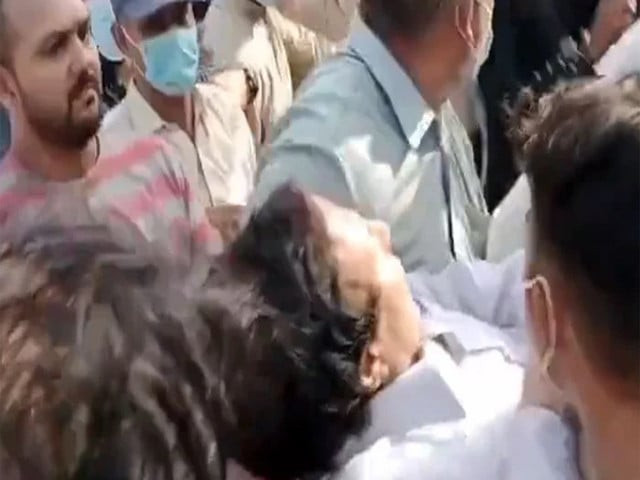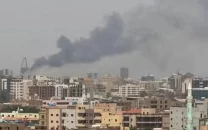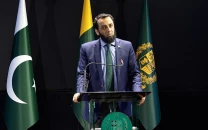Elahi rearrested after short walk of liberty
Ex-Punjab CM detained at Attock jail for 15 days

In a dramatic turn of events, former Punjab Chief Minister Chaudhry Parvez Elahi found himself at the center of a legal and political storm when he was arrested by Islamabad police, defying explicit orders from the Lahore High Court (LHC) prohibiting his arrest in connection with any First Information Report (FIR) or inquiry.
The arrest has raised questions about the rule of law and the power dynamics in Pakistan's political landscape.
Chaudhry Parvez Elahi, a prominent political figure and the central president of the Pakistan Tehreek-e-Insaf (PTI), was arrested under Section-3 of the Maintenance of Public Order (MPO) by the federal capital police in Lahore.
This move was made at the behest of Islamabad District Magistrate Irfan Nawaz Memon.
Notably, his arrest came immediately after his release following an order from the Lahore High Court, which had directed the Punjab police, National Accountability Bureau (NAB), and other law enforcement agencies not to arrest him under any circumstances.
This arrest took place while Elahi was traveling on Canal Road.
Initially, it was thought that Elahi would be detained in the Adiala Jail in Rawalpindi. But later the authorities changed their plan and took him to the Attock District Jail, where he had been lodged in a special security barrack away from other prisoners.
Issuing the order under the 3 MPO, the Islamabad district magistrate said that Elahi was an important leader of the PTI and there were many supporters of the party in Islamabad. He expressed the apprehension that Elahi and other PTI workers might disturb the law and order situation in Islamabad.
He added that Elahi was being detained for 15 days on the recommendation of senior superintendent of police (SSP) of the Special Branch and the Intelligence Bureau (IB) on the reports of the Divisional Intelligence Committee. Elahi had the right to challenge this order in the court, it said.
During the LHC proceedings, Justice Amjad Rafiq explicitly directed NAB to release Elahi and issued a clear directive stating that Elahi "shall not be arrested in terms mentioned therein including the NAB or any other authority/agency/office etc., nor shall be detained under any law relating to preventive detention."
Justice Rafiq, presiding over the case, displayed his displeasure with NAB and the provincial government's conduct throughout the proceedings. He went as far as warning the NAB authorities of issuing an arrest warrant for the NAB director general if Elahi was not produced before the court within one hour.
The proceedings also witnessed a letter from the provincial government, which cited ongoing security operations against terrorism and threats to politicians, including Elahi, as reasons for the delay in producing him before the court.
The Counter-Terrorism Department (CTD) report apparently lent credence to these concerns. However, Justice Rafiq admonished the attempts to undermine the court, cautioning against playing "ping-pong with the court."
Despite multiple adjournments, Elahi was eventually produced before the court, and Justice Rafiq ordered NAB to release him. This decision seemed to reinforce the Lahore High Court's earlier directive.
Elahi's Petition
In his petition challenging his arrest by NAB, Chaudhry Parvez Elahi claimed that his detention flagrantly violated the LHC's order, which explicitly prohibited his arrest in unknown FIRs or pending inquiries.
Elahi's argument centered on the lack of transparency regarding the NAB-initiated inquiry on June 9, 2023. The NAB had failed to disclose this inquiry before the court despite orders to provide information about all criminal cases or pending inquiries against him.
Elahi contended that this inquiry fell under the category of "blind or unknown inquiry," and as such, the respondents (ACE, FIA, NAB, CCPO, DIG of police operations, and others) were prohibited from arresting him.
Therefore, his arrest in connection with such an inquiry blatantly contradicted the court's directives issued on July 13, 2023. The petition also sought a declaration that the new investigation, which resulted in a call-up notice issued on August 25, amounted to a violation of the court's orders.
Furthermore, the petition requested the court to instruct all respondents not to arrest him in any other unknown criminal case, inquiry, or investigation. It also sought to grant Elahi reasonable freedom to approach the relevant courts should any criminal cases arise against him in the future.
Political Fallout
Chaudhry Parvez Elahi's arrest and subsequent legal battle have not occurred in isolation.
They have sparked a political storm, with PTI's Core Committee condemning his arrest and demanding his immediate release.
The committee also expressed solidarity with PTI South Punjab President Senator Aun Abbas Bappi and expressed grave concern over the trial of PTI Chairman Imran Khan, who is currently incarcerated.
Additionally, the committee reviewed the hearing of Imran Khan's petition against amendments to the National Accountability Bureau (NAB) law at the Supreme Court.



1675249047-0/image-(18)1675249047-0-208x130.webp)















COMMENTS
Comments are moderated and generally will be posted if they are on-topic and not abusive.
For more information, please see our Comments FAQ